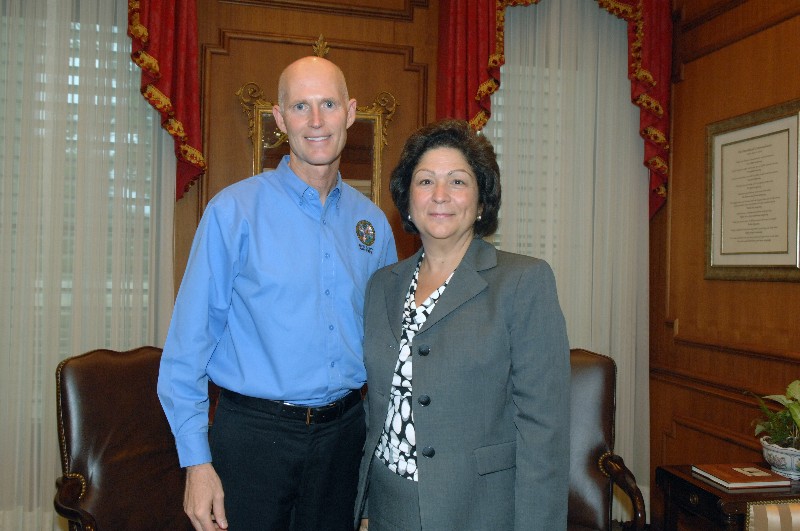
'It's a nightmare': Florida's unemployment call-takers describe system failures, miscommunication
The people answering phones for the state's unemployment office say they're helpless when it comes to actually helping.
Unemployment Maze: Worker shares what it's like to help people apply
Volume 90%
JACKSONVILLE, Fla — A colossal, systemic failure of Florida's unemployment claims system has left hundreds of thousands of Floridians in limbo. Many have turned to the state's Claims Assistance Center for answers, only to find the voice on the other end of the phone line likely knows as little as they do.
In early April, Governor Ron DeSantis touted the hiring of hundreds of people to staff the "call center" for the Florida Department of Economic Opportunity (FDEO), the state's unemployment claims office.
Steps To Take If You Are Laid Off
First Coast News has learned the "call center" is mostly just an assortment of temporary employees, many spread across the country, put into the job and told to provide callers with the basic information found on FDEO's website.
Over the past 48 hours, First Coast News has conducted interviews with several current and former call-takers responsible for manning the phone lines and responding to the surge of calls from claimants looking for answers to help their claim along.
These call-takers paint a picture of a disorganized and dysfunctional system for receiving calls that is compromised by a systemic lack of communication.
Accounts of three workers follow, all of whom said they were assigned to work FDEO phone lines as temp agents through Tampa-based staffing company Kforce, contracted by Fort Walton Beach-based tech company Titan Technologies.
According to their accounts, Titan Technologies oversees the phones while Kforce provided the increased staffing to answer them.
We reached out to both Kforce and Titan Technologies for comment. Kforce declined to comment, saying the company does not discuss details of contracts with clients, while Titan Technologies has not responded.
FDEO did not provide a response to many of our questions prior to our publishing deadline. However, a response we received is at the bottom of this article.
In the conversations we had with these call-takers, First Coast News found that:
- Call-takers were not equipped at the start to work with CONNECT, and throughout their time have been unable to answer claim-specific questions.
- Threats of suicide by callers are not unheard of, and call-takers did not feel prepared to handle these situations.
- The supervisors directly overseeing call-takers have just as little, in some cases less, knowledge than the call takers themselves.
- DEO agents, the people capable of actually revising claims and wage verification, were not readily available to call-takers or callers to answer questions.
- Call-takers were given scripts to read to callers and were told to base their answers only on what is readily available on FDEO's website.
- Systemic glitches prevented call-takers from filling out applications for callers who needed human assistance. Call-takers also described glitches that "zeroed out" claimant's wages, as well as glitches that kept CONNECT from receiving wage information from the state's wage verification system.
- The ability of call-takers to do their jobs was hampered by a lack of clear understanding of their duties and conflicting information from higher-ups.
All of the people we interviewed were vetted to ensure they did work on behalf of Titan Technologies and FDEO. Their names have been changed and any identifying information has been left out for the purpose of confidentiality.
These are their stories.
Carina: "There wasn't a heck of a lot we could do besides reassure people and let them complain."
Scrolling through Facebook in March, Carina saw a post her father had shared. A "friend of a friend" was looking for people to answer calls for a temp agency contract with the U.S. Small Business Administration.
She got the job, starting March 30, but within a few days, things changed.
"One day I got an email saying to take a training, and -- boom -- I was on the DEO project," she said. "I didn't know what I was doing. They told me to do a training, and there I was."
Carina began answering phones for FDEO starting around April 6, until Friday, May 8 when she said she and all the other out-of-state temp agents were taken off the phones following a request by Gov. DeSantis. His office has not provided comment for this story.
She said she took an 8-hour training course before she began answering questions.
"A lot of the training consisted of how to answer phones, check emails for scams, a lot of customer service type things," Carina said. "I also watched a video FDEO created that was, like, PowerPoint slides of how to do a PIN reset."
Right off the bat, Carina realized that she and other call-takers weren't trained to handle the kind of calls they were receiving. Additionally, the supervisors she and other call takers answered to also seemed to be in the dark.
"We were being told to have people call the 800 number or the 833 number and select [the claim-specific] option, but that would still come to us," she said. "We were getting calls we weren't equipped to take, and we were still being asked to take them."
She said at the start of the "campaign," the website was so slow for call-takers, it would take 45 minutes or more for a page to load. She would sit on the phone with the caller, "just listening to the other person breathe, essentially. For hours on end."
Even with the addition of servers to enhance system capacity, as noted by Gov. DeSantis, Carina said the website still frequently crashes.
"Sometimes they take it offline saying it will be offline for 30 minutes," Carina recalled. "Three hours or more later, it's still offline. Sometimes they would take the claimants' part offline, sometimes they would take our part offline. Most of the time it was without notification and no way of knowing when it would come back up."
As call-takers, Carina and others had the ability to fill out a new application for callers. This is especially vital for those who cannot access the system, including those with physical disabilities or lack of Internet access.
But the completed applications couldn't be submitted. Each of the call-takers we spoke to confirmed the submit button was "greyed out," and therefore unusable.
"No matter what information you typed in, you could not submit that page of the application and get to the next page. This is something they knew about, and they kept pretending they didn't," she said. "[The supervisors] just kept acting surprised and giving us answers that implied we were doing something wrong."
At one point, Carina said one of the call-takers, who was also a college student studying computer programming, was able to find a workaround to the "grey button" issue in the HTML coding. She said she and others started using the workaround as well but were told to stop or be fired.
So why are the call-takers there to begin with if they cannot do something as simple as submitting an application?
"Just to be a listening voice on the other end, a lot of times that's what they told us to do," Carina said. "We could not do much of anything else."
She said call-takers were told by supervisors to refer to the resource guide and "Frequently Asked Questions" on the state website in order to answer callers. Call-takers would also receive pre-shift notes with common issues and lackluster solutions.
Asked how many calls dealt with eligibility issues or applications stuck in "pending," Carina said, "Almost all of the calls."
But call-takers lacked the ability to see why applications were stalled -- or any other information that might help answer specific questions.
"Absolutely nothing," Carina said. "There are things we could see in the system, but we weren't trained to interpret what they mean, and we weren't allowed to tell them anything [claim-specific]."
Carina also acknowledged that people were being told to go into the system and claim their benefit weeks when the requirement had been waived. She would reassure them they did not have to, despite promptings from the system.

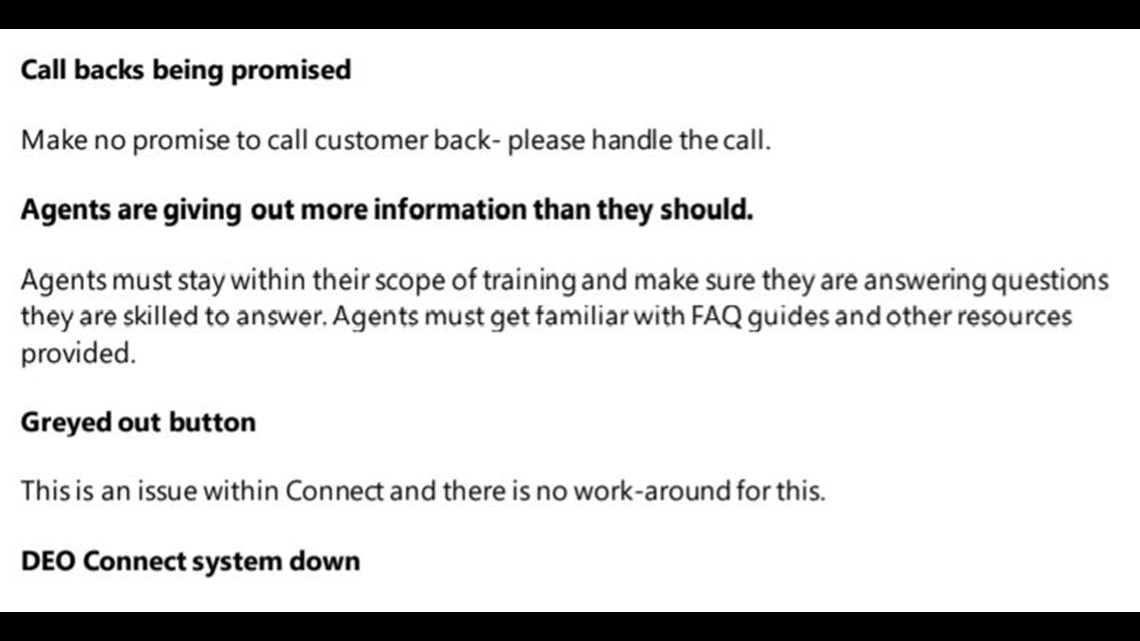
Credit: WTLV
Carina's pre-shift notes from her supervisors show common problems and workarounds.
Carina said frequent callers eventually familiarized themselves with the capabilities of the system and of the call-takers.
"A lot of times the first question would be 'Is your system up?' They knew, these people had been calling 200 times a day for eight weeks," she said. "They were despondent, desperate, people crying. Half of our shifts were just people crying, and saying 'I'm losing my house, they're turning off my lights, I'm worried my car's gonna get [taken].'"
The calls were emotional for Carina, too.
"I could only work four-hour shifts ... because it was so hard. It was so sad," Carina said through tears over the phone. "And I couldn't do anything to really help them."
"We were just someone to answer the phones for them and to tell people to wait. I felt like a puppet," she said.
One morning, Carina said she woke up to a pre-shift email detailing what to do if a caller threatened suicide or made bomb threats. She and other call-takers we interviewed said threats of suicide over the phone were not unheard of.
Part of the protocol in the case of a suicide threat was to contact a supervisor through a designated "threat chat." But Carina said that chat took a long time to get a response.
"I'm a temp worker, not a trained counselor. You tell me I'm not allowed to call the authorities, but I'm waiting 45 minutes on the phone with somebody threatening to hurt themselves," she said. "Fortunately, I didn't talk to anyone actually threatening suicide, but I did talk to a lot of people who mentioned it, saying 'I don't have any other choice if I can't get this done.'"
Carina can remember many calls in detail -- most with desperate people trying to understand why their claims were taking so long to be processed.

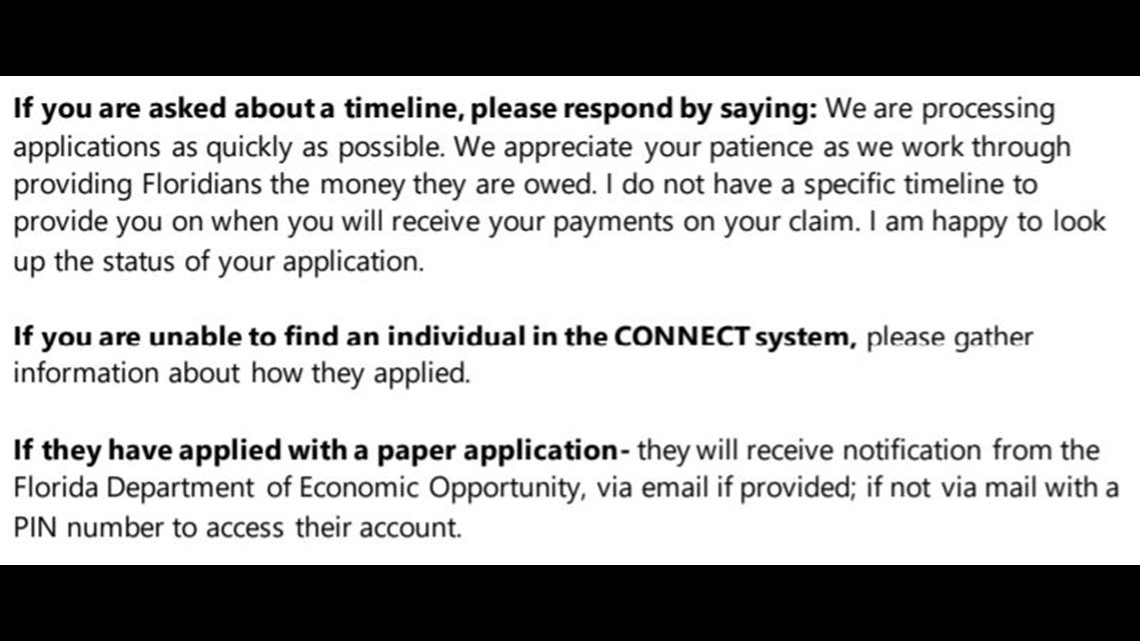
Credit: WTLV
Snipping from Carina's pre-shift notes showing a script for call takers.
One day at the end of April, Carina said she remembers getting a call from a senior woman who needed help filling out her application.
"It was the last day of April and she told me 'My landlord said if I don't pay then I have to get out.' She's like 'What am I gonna do?'," Carina said crying. "And she hadn't even been able to submit her application. And I wasn't able to submit it. I don't know what happened to her."
"So many times I just wanted to take people's addresses and send them money," Carina said in tears. "Because I had a job..."
Jennifer: "I'm a whistleblower. I don't let stuff slide, I call it out."
A Florida resident, Jennifer is still on the job after finding it through a Facebook post by a Kforce recruiter. Like Carina, Jennifer started off working for the SBA project before starting for FDEO in early April.
"It started with a six-hour virtual training, primarily about privacy and email security," she said. "But technically we're not supposed to be emailing people or be on email, so we thought that was really weird. Why was there so much time spent on that? They needed to spend that time actually training us about unemployment, and eligibility requirements and terminology."
The only training Jennifer received on FDEO's CONNECT system was about PIN resets. She said they did not receive an explanation about FDEO's website, and she said within three days the call-takers were surprised when the state unveiled a new mobile-friendly website called Pega.
During the rollout of the new site, Jennifer said she and other call-takers didn't know how to answer questions about messages showing "No Records Found" on claims, and were told to tell callers to reapply.
"We were getting really poor advice from our so-called 'supervisors,'" she said. "Most of the tools we have, we learned ourselves. Just by clicking and searching through CONNECT to see what we can find."
After someone applies on Pega, they are supposed to get correspondence from FDEO with a PIN to log into CONNECT, showing the application had been imported. But Jennifer said few callers receive that correspondence, and there have been problems with temporary PINs.
Eventually, Jennifer found out how to take an application for someone over the phone. She would then be able to give the caller the PIN and have them finish the application through CONNECT on their own.
Like Carina, Jennifer experienced the "greyed out" submit button. She would also hear from people struggling to get a claim filed through the new mobile site, helping them get as far as they could and handing back the reins so they could go on and finish.
"People would cry to me, 'No, no, no, don't make me go back in. I'm going to get kicked out, it's going to crash, I've already spent hours,'" she said. "And I would ask, 'Really?' And then I found out 10 days after that, [the supervisors] finally admitted to us that they were [processing] all those in at 40,000 a night."
The issue was that people who applied on or before April 4 and were deemed "ineligible" were being told to go back in and reapply on the new site.
"They sent hundreds of thousands of people to this site where nothing would happen," Jennifer said.
She realized that starting an application over the phone for callers whose applications show "No Records Found" on her end would allow them to bypass the need for their Pega applications to be imported into CONNECT.
While it is well known, the state has not directly confirmed that there have been glitches with the CONNECT system or with its compatibility with Pega. The department has said those deemed "ineligible" do not qualify for state benefits, and those whose applications are still "pending" likely didn't completely fill out their application to begin with.
And all the call-takers we spoke with told us they were directed not to ever use the word "glitch" when talking with callers.
But every call taker we spoke with, including Jennifer, confirmed there are system glitches, like the "No Records Found" problem, along with the "greyed out" submit button.
"And most agents have no clue, so they're going to tell them, 'Sorry you haven't been imported, call back,'" she said.
Jennifer said she and other call-takers have had just a single conference call with actual FDEO agents, the only people who can manually revise claims, in the past month. She said those agents told them if someone shows as "No Records Found" to manually take the application and issue a PIN, but the error continued.
Another big problem has been in the employment history portion of claims.
"We discovered we can go in and look at the wages, at the determinations, at the employers," Jennifer said. "If the employer's not listed there, there's no way the wages would ever import in."
As we have reported, many claimants have reached out to us saying they were deemed "ineligible," even though they are full-time W2 workers who should qualify for state Reemployment Assistance benefits.
Jennifer said she and other call-takers saw the crash of the interface that allowed CONNECT to communicate with the state's wage verification system, zeroing out wages. FDEO has not confirmed this glitch exists.
"When the technology doesn't work, these files just sit there until an actual person puts in that name or that claimant ID and says 'Oh, that's what that issue is," she said. "That means I manually have to go into [the wage verification system], type in the employer and pull out the data and manually put it into CONNECT.'"
Jennifer said there are more reasons someone could be "pending" or deemed "ineligible" than FDEO has said publicly.
"Somebody, they had the same job but they switched payroll companies or the ownership changed. So when the wages got verified, maybe it only showed one quarter of wages for 2019, instead of all four," Jennifer said.
Like our other interviewees, Jennifer said the biggest issue for call-takers is an overall lack of communication from higher-ups.
"We have no help desk. We have no IT help desk that we can reach out to, we have no true DEO resource or supervisor. Nobody."
"It's not that the volume of people made [the system fail], it's just that the volume of people exposed it," Jennifer said.

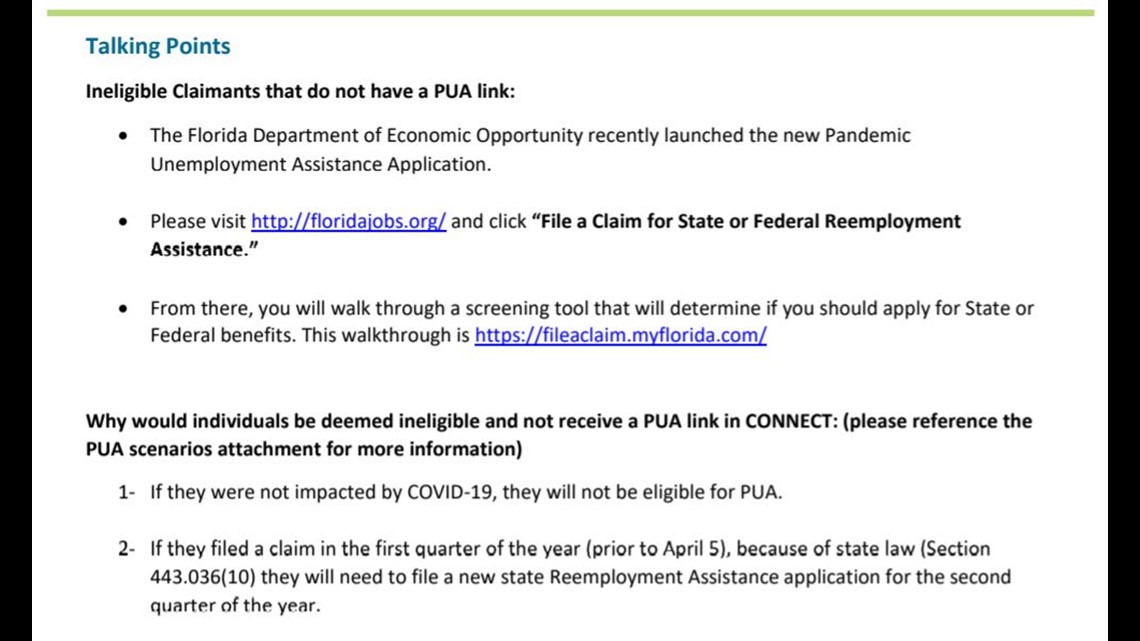
Credit: WTLV
Talking points provided to call takers surrounding Pandemic Unemployment Assistance (PUA).
Alice: "It really led to a big decline in my mental health. We weren't in a position to actually do anything of worth."
Like the others, Alice was brought on to answer phones for FDEO through Kforce. She had reached out for a different assignment, but her recruiter placed her on the FDEO "campaign" and she was told it was a temporary, likely week-long assignment.
By this point, Alice has been taken off the assignment because she was one of the many temp agents living out-of-state and working the phone lines.
"It was just kind of from one day to the next, just kind of thrown on there with very little training, and just started answering calls," she said.
Also like the others we interviewed, Alice received some training online prior to starting to actually answer phones. The training was self-paced and included FAQs found on FDEO's website.
Periodically, she said, they would receive specific guidance on issues that would come up. Below is a document Carina sent us that details for call-takers how to reopen applications and claim weeks for callers.
"It just really felt like a big game of, you know, 'The news stations are reporting this and DEO is saying this, but we haven't told you anything of it,'" Alice said. "It created so much confusion and anger -- not just between the agents themselves, but with the callers."
"The callers would call and expect up to date information, and we weren't getting that. I don't think, ever, did we get on-time, accurate information."
When she started in early April, she said she was given a PDF with screenshots of how to do things on CONNECT, like resetting PINs. But in actuality, she said their ability to do simple tasks was hampered by system issues.
And as for all those callers trying to find out why their claim was stuck?
"We were never given the ability to answer those questions," she said. "I know I personally did take the liberty to let them know if there was any correspondence sent to them, going based solely off the notes put into the claimants accounts."
"Or if there was anything I thought was missing, I told them. But technically speaking, we were never given the authorization to give anything claim-specific whatsoever."
All call-takers we interviewed, including Alice, described a long delay in the supervisor's chat set up to answer their questions. Alice said she had friends working on the project, and so she was able to reach out to them for help when she needed it.
"We also had an out-of-work group chat going on, and it was just a lot of us helping each other out," Alice said. "Because we really couldn't count on anybody higher than us to really give us any valid answers."
On Friday, the last day she worked, Alice said she was trying to find out when all the Pega applications would be moved onto the CONNECT site and how fast they were being processed.
In her conversation with a supervisor, she said she was just given information found on the FAQ she already had access to.
"It was really disheartening because, constantly, it just got to the point where I was like, 'You know what, the supervisor chat is useless,'" she said. "Because they really don't know what they're talking about."
Both call-takers and claimants we have heard from have said increased communication from FDEO would be helpful, especially for those claimants unsure of whether to reapply since they have been stuck on "pending" so long.
But often either scripted answers that avoid the question, or even just silence, have become the norm.
"We're seeing the DEO going out in front of all these news reporters and saying certain things, but we're being told something different in our position," Alice said. "A lot of times we weren't getting clear answers, we were getting the runaround. So when we had a caller dealing with a specific situation, every agent who answered would give them different information."
"We were never really on the same page. We tried, but it's hard without proper guidance."
Along with seeing the issue of zeroed out wages and being unable to submit applications due to the "greyed out" button, Alice said the system was either extremely slow or simply not functioning for her.
Alice said she and other call-takers felt like a buffer between FDEO and claimants. Without the ability to help people, she said she saw a decline in her mental health over time, and often spent her free time crying.
"I actually cried on the phone with one of my callers, I think that was the lowest point [for me] during this whole thing," she said. "She was having to take care of elderly family members and she was sick herself, and she couldn't find out how to do the application on the computer."
"I had to give her the option of going to FedEx and filling out an application on the computer. I know those paper applications have not gone into the system. They just seem to disappear."
As of May 8, FDEO lists 163,078 "paper applications entered by state employees." It remains unclear how many of those applicants received any follow-up correspondence from FDEO, whether by mail or e-mail, or how many paper applications specifically have yet to be entered.
Alice, who said she has worked as a call taker before, said she had never experienced the kind of emotions she had answering the phone for FDEO.
"To see this level of desperation was heartbreaking," she said. "It wasn't my place to get mad because somebody was yelling at me. It was just kind of my place to listen. It was just a lot of listening and trying to be there for them."
"They were just happy to have someone on the line after months of trying to get through. There were a lot of days where I would just lay down and cry," she said.
"You hear a lot about 'Oh the government doesn't care,' and this and that. So many Floridians are on the verge of losing their homes, or don't have money to get groceries," Alice said in tears on the phone.
"Just... having to hear what they're going through and knowing that you're working and making a paycheck working for a department that is so beyond broken, and these people are out there struggling to put in a claim for the money they basically have paid into the system..."
"It takes a toll on you. It really just makes you reconsider everything. I dealt a lot with morals and wondering if what I'm doing is right."

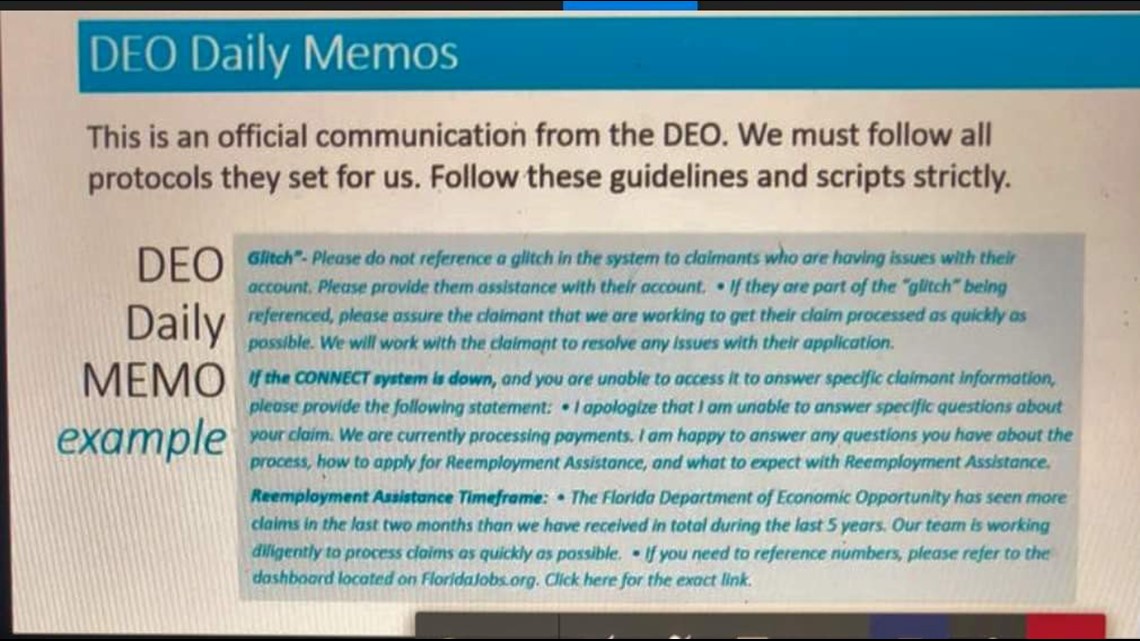
Credit: WTLV
An example of directions given to call takers by their supervisors.

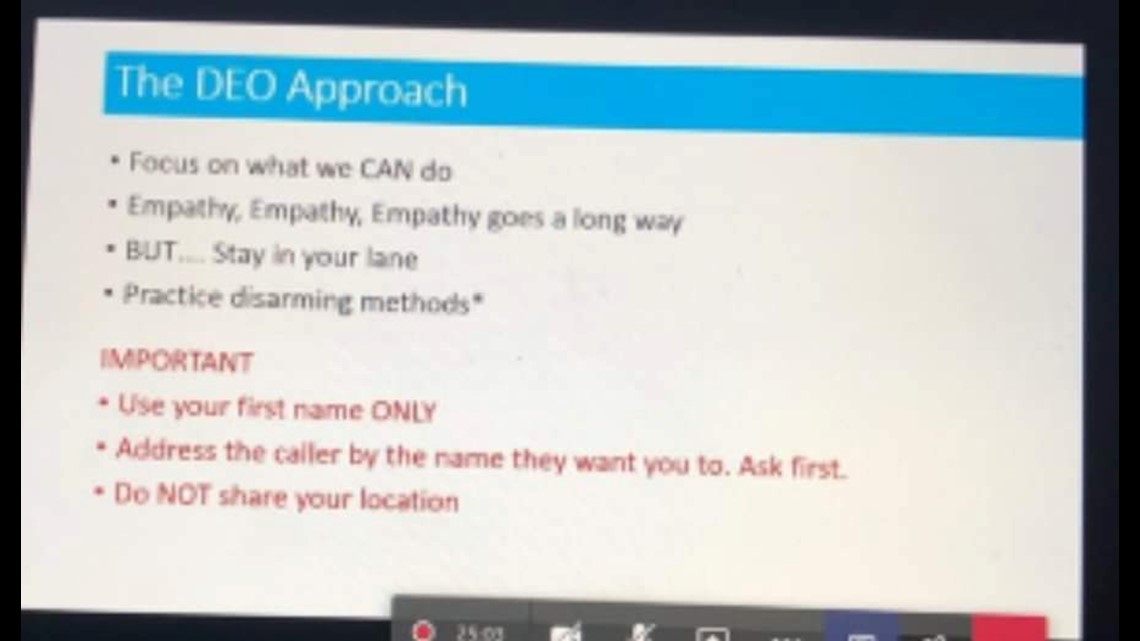
Credit: WTLV
Tips given to call takers on how to approach a conversation.
FDEO Responds
We reached out to FDEO early Monday for a response to several questions, as well as with a public records request related to the department's contract with Titan Technologies and communication with the company.
The following questions were given to FDEO:
- Of those tasked with answering the phone lines for DEO, approximately what percentage are actual DEO agents (state employees) and what percentage are temp agents?
- Of those temp agents, how many had previously been working from out of state? I'm aware there was a recent directive to let go of temp agents answering the phones from out of state, I'm wondering what that number was this time Friday?
- How many people, in total, are tasked with answering phones for DEO between both temp agents and DEO agents?
- Why are temp agents answering overflow calls to the claim-specific line if they are unable to provide claim-specific answers?
- Are temp agents being trained on how to use CONNECT before starting to answer calls for DEO? Has that always been the policy?
- How often are temp agents being briefed by actual DEO agents in order to answer specific questions about the system and proper procedure as it changes by week?
- Is there a process for temp agents to ask direct questions of DEO agents in their capacity?
- Why are the direct "supervisors" for these temp agents recently-hired workers for Titan Technologies, who I've been told are not well-versed in CONNECT and simply direct these call-takers to view FAQs and floridajobs.org for answers?
- Is DEO aware of glitches found by call-takers, including a "greyed out" submit button on a page in which they should be able to submit an application for a caller, as well as the zeroing out of wages in claims? Is the zeroing out of wages caused by an interface issue with how CONNECT communicates with the state's wage verification system?
- Is DEO aware of a lag in communication on a "threat chat" created to assist call-takers with callers making suicide or bomb threats?
- Nightly, what is the average amount of Pega applications that are being processed into CONNECT? Has this number improved since the mobile-friendly site was launched?
- Why have call-takers been receiving conflicting information from supervisors in the past weeks and relaying that conflicting information to the public? This includes topics like whether to claim weeks, whether to reapply on Pega, whether a call taker has the ability to reapply, whether call takers are allowed to answer claim-specific questions, etc.
FDEO spokesperson Paige Landrum responded Monday morning with the following answers:
"Agents trained before answering calls – DEO has more than 2,000 people answering calls for the Florida Reemployment Assistance program via our current staff, new hires and call centers. Many of these individuals have been training on the most common questions, but not all aspects of CONNECT and the Reemployment Assistance program. Individuals who call the Reemployment Assistance Call Center should select the option that best suits their needs, as the person who answers the phone will be trained in the option they selected. For instance, if a claimant selects PIN reset. The call center agent will be able to reset their PIN, but may not be able to answer a claim specific question. For claim specific questions, individuals should select claim specific. We are training more and more individuals on claim specific inquiries every day.
Average amount of Pega applications being processed – I will work on getting this exact number, but I wanted to be sure you knew about this dashboard."
First Coast News also submitted a public records request for FDEO's contract with Titan Technologies. We received the contract and signature pages below:
What comes next?
Starting Monday, claimants will once again have to return to the CONNECT system bi-weekly to claim their weeks. But, the executive order signed by Governor Ron DeSantis waiving work search requirements has been extended to May 30.
The governor seemed to wrongly state claimants would not have to log back in to claim weeks in a press conference Monday, but as of this article's publishing, the claiming of weeks is required.
We await answers from FDEO on other questions, but as of right now the state continues to state that applications are being processed in the order they are received and by which claims are "most complete."
It remains to be seen how exactly the state will implement a feature allowing for users to stop their benefits as people return to work. A spokesperson tells me that it is in the works, and right now the guidance is to call or email and let an agent know.
If your workplace is reopening, you will not be able to continue to receive benefits, even if you feel unsafe returning to work.
A significant number of people remain in "pending" status, another large group have been wrongly deemed "ineligible," and more are waiting for the link to apply for Pandemic Unemployment Assistance (PUA) to open for them on CONNECT.
FDEO said call-takers are being trained further on CONNECT, but it remains unclear on whether it will be up to FDEO agents themselves to correct the issues with any claim that has fallen victim to glitches. Before we learn that, FDEO will have to acknowledge there were glitches to begin with.
If you want to reach me, my email is DJones@firstcoastnews.com. I've been flooded, but I'm doing my best to respond as quickly as possible.


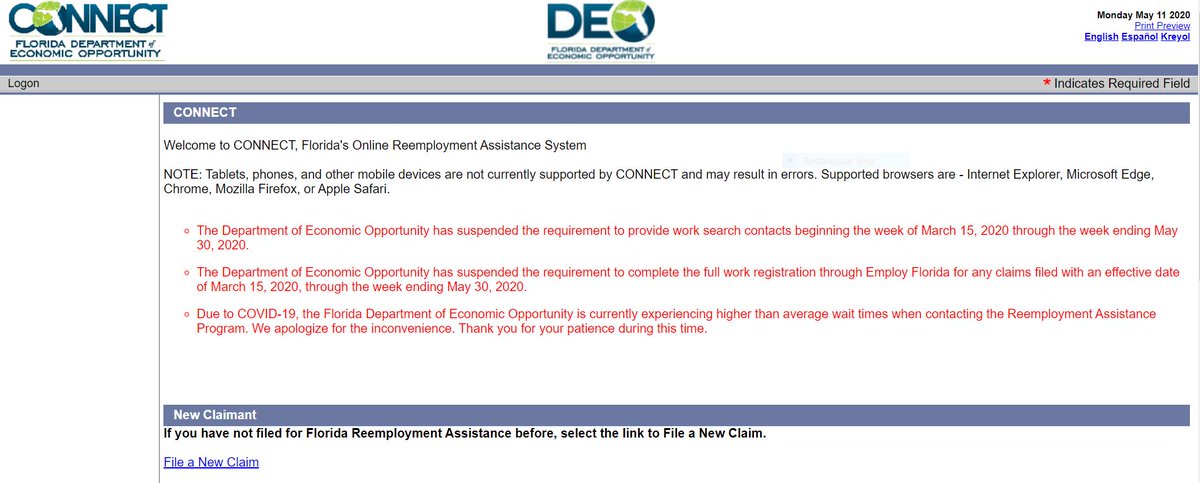
No comments:
Post a Comment